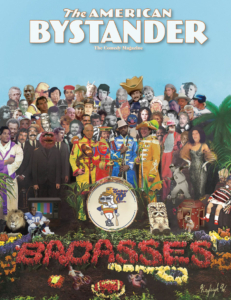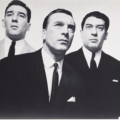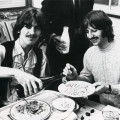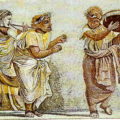- From Faith Current: “The Sacred Ordinary: St. Peter’s Church Hall” - May 1, 2023
- A brief (?) hiatus - April 22, 2023
- Something Happened - March 6, 2023
 (And now, a brief word from our sponsor…)
(And now, a brief word from our sponsor…)
The latest issue of my print humor magazine, The American Bystander #23, is all about the Seventies. Given that so much of this blog talks about that very distinctive time, I thought I’d hondle everybody. Try it, you’ll like it—and at just $5 for a PDF and $20 for a print edition, how wrong can you go?
Needless to say, buying one’s a great way to support this site, which isn’t cheap to host.
Also, dig that parody cover; it’s not a Gerber production without Beatle references dontchaknow. But there’s a deeper level of logic at work. To my mind, the entire Seventies took place in the shadow of the epochal pop culture that had come before in the Sixties—to me The Seventies often feel like a parody of the Sixties, from groups like The Bay City Rollers weakly standing in for The Beatles, to JFK’s era-defining assassination being replayed as farce, with not one but two women trying to shoot President Ford unsuccessfully over the space of three weeks. What would’ve changed if Jerry Ford had died? Nothing; that was the Seventies in a nutshell—even assassinations, as potent a signature of the Sixties as Pepper, would have to wait until 1980 to feel impactful again.
The collection presented on Pepper‘s cover was of people of great worth—artists and writers, gurus and Gandhi. Even poor Stu is there partly for his role in the Beatles story, but also for how J/P/G/R thought he would have changed the world. It’s only right that the Seventies version be people from TV, wrestlers, athletes, dreck from childhood. (The issue was inspired by a great, hilarious Twitter feed, @super70ssports, and the people in our collection are frequently mentioned on their feed as”badasses.”)
At its heart, the Seventies’ chronic low self esteem stemmed from the fact that they couldn’t deliver. It wasn’t the Utopia that the Summer of Love promised; instead it was a decade filled with flotsam and jetsam, a morbidly self-aware time that was nostalgic for itself even as it was happening. Pepper in 1967 made the promise of pop as art, and the Seventies could not deliver anything but pop as product, as wallpaper, as background for childhood. Hence, this cover.









I look forward to ordering a copy as I am both proud and ashamed that I recognize so many of the figures on that cover. That means I was either paying attention to the world around me or that I was watching way too much television.
Thanks @Neal!
Just ordered a print copy. I’m very happy to support this site!!
I’m a child of the 70’s, so this is right up my alley. I’m excited to read it!
You’ll see a lot of stuff you remember, @Tasmin! Thank you.
There was some great music in the 70s, though, and Tommy came out right on the cusp, I think. CSNY’s “Ohio” — one of the best political songs ever. And Steely Dan showed up.
It felt to me (as a little kid in the 60s and a teen in the 70s, that just as the Beatles music grew up, so maybe did other rock music. Although maybe it was just what I paid attention to, growing up myself.
Yippee!
Unsolicited endorsement of this, my first, issue of The American Bystander.
It arrived this week and, once I started, I read it from cover to cover. Fellow Dullbloggers, if you lived in the 70s and, unfortunately, remember that most anodyne of decades, then you will get a serious laugh from the writing and references. Donnie Most as a Talmudic scholar? Hemingway, Storyboards, and The Battle of the Network Stars?
Michael, much respect that you can devote the time you do here and come up with this comedic gold.
Btw…Don Cornelius, RIP, was the absolute coolest of the cool. Who, but Don Cornelius, could invite James Brown to return “With his whole orchestra?” (1:20 spot in the video) Sorry to ruin this question in the quiz for anyone who has yet to take it, but Don is the definition of cool.
@Neal, thank you for ordering and yes, I work a lot. 🙂
The magazine is a labor of love and I plan to do it for as long as people enjoy it. Similarly, this site. It’s time for me to make more money, but I’ll try to keep a hand in here.
Every HeyDullblogger will know which song George Martin is talking about in his endorsement of Sanka: